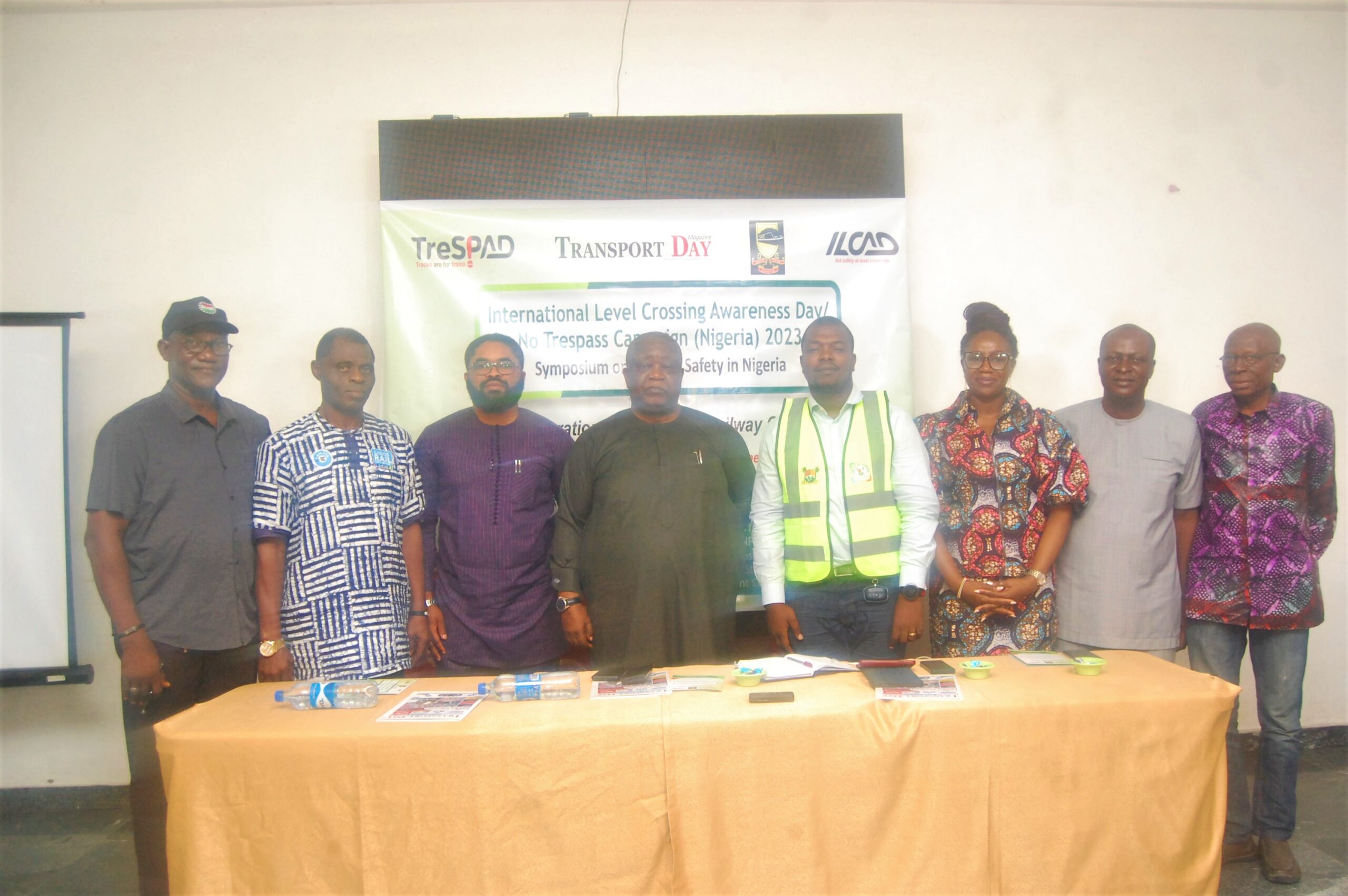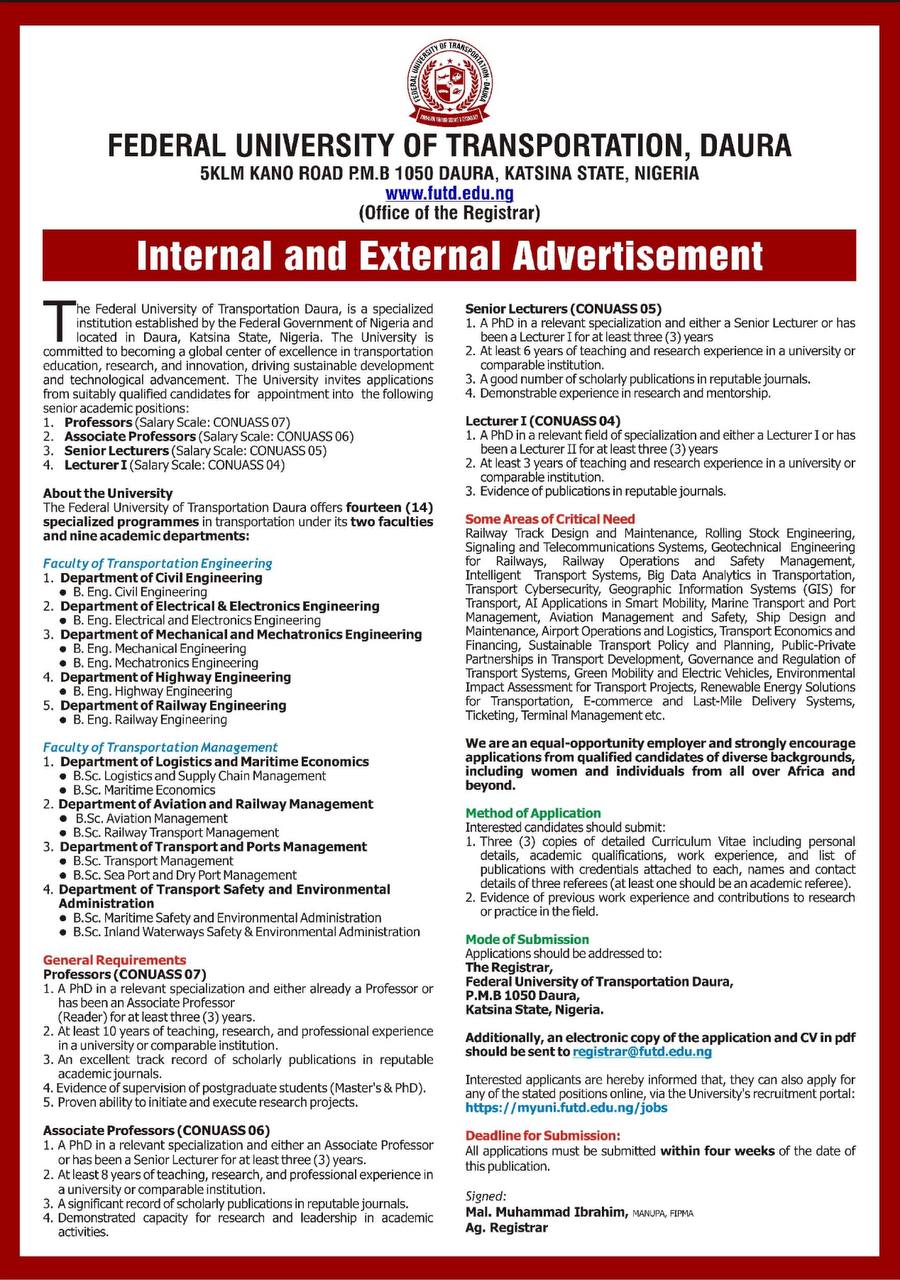Photo Caption
L-R: Secretary General of the Nigeria Union of Railways, Comrade Tim Esan; Representative of the Managing Director of Lagos Metropolitan Area Transport Authority (LAMATA), Mr. Akinwale Akintola; Managing Director of Nexant Consulting, Mr. Toks Akingbade; Managing Director of Nigerian Railway Corporation (NRC), Mr. Fidet Okhiria; Representative of the Director General of the Lagos State Safety Commission, Mr. Ajomo Ebenezer; A Safety Expert, Mrs. Bola Edwards; Managing Editor of Transport Day, Mr. Frank Kintum; and the Vice President, Legacy 1995, Mr. Taiye Olaniyi, at the Railway Safety symposium under the auspices of International Level Crossing Awareness Day (ILCAD)/No Trespass Day, organized by Transport Day in collaboration with NRC, held in Lagos on Thursday, June 15, 2023 in Lagos
Thursday, June 15, 2023, the world celebrated the International Level Crossing Awareness Day (ILCAD) and the International No Trespass Day (Trespad). And Nigeria was not left out. In Lagos, a symposium was organized by Transport Day in collaboration with the Nigerian Railway Corporation (NRC) where stakeholders preached railway safety.
On hand were the Lagos state government as represented by the Lagos State Safety Commission, as well as the Lagos Metropolitan Area Transport Authority (LAMATA), Nexant Consulting, Strap and Safe Child Foundation, Nigeria Union of Railway Workers (NUR), NewsTrend, Legacy 1995 etc.
They all made submissions on railway safety from different perspectives.
The Managing Director of the Nigerian Railway Corporation, Fidet Okhiria, explained that trains have the right of over ambulances, patrol vans, other vehicles and pedestrians at level crossings.
He stated this against the backdrop of frequent accidents at level crossings in the country and warned that trains are not required to slow down at the crossings for other users.
Even as the NRC MD said the Federal Government in collaboration with the Lagos State Government was already replacing the level crossings with flyovers/underpasses in Lagos, he noted that some areas within and outside the city would still have crossings.
He said any motorist or pedestrian involved in any collision with a train at the level crossing or rail track is liable.
He said, “Trains are not required to slow down at crossings and their speed can often be difficult to gauge.
He said the NRC had made provisions for safety measures at the approach of level crossings such as road signs, siren, barrier, lights and level crossing keepers.
He urged all road users to obey the signs and pay attention to their environment when approaching level crossings.
“Always remember that where there is a crossing, there is danger. When you see a sign indicating a crossing, slow down, look and listen and be prepared to stop at the stop sign. The flashing lights are there to warn you of oncoming trains and failing to stop under this circumstance is a very dangerous act,” he said.
According to the NRC boss, a train will take a long time to stop, even when its driver slams the brake, adding that a loaded train can take more than one and a half kilometres to stop.
“Modern trains are quieter than ever. Make sure you can hear the sounds of oncoming trains. Using earphones, loud music and screaming make crossing the railway line more dangerous,” he stated.
In his presentation, the Director General of the Lagos State Safety Commission, who was represented by Mr. Mr. Ajomo Ebenezer, stated that “There are four major sections in railway transport that have high risk potentials-Level Crossings, Stations/Terminals, Coaches and Rail track.”
He identified factors that can compromise railway safety to include limited visibility, driver error or recklessness, insufficient warning systems and inadequate signage.
In his submission, the Managing Director of Lagos Metropolitan Area Transport Authority (LAMATA), who was represented by Mr. Akinwale Akintola, submitted that “LAMATA has identified 10 Level crossing in collaboration with NRC, and it’s currently building five (5) overpass which is Pen-cinema, Ikeja, Mushin, Yaba, and Oyingbo Overpass. Which is due to be delivered by the end of this quarter. These overpasses is a total grade separation which is Zero tolerance to accident at Level crossing and total elimination of the Level crossing.”
According to the MD, LAMATA has identified some potential dangers and threats at level crossings and has deployed some measures such as ensuring the blue line has its own right of way and it uses EMU (Electrical Motive Units), which is electrically run and it’s a high risk.
“All the station on the blue line corridor are well fortified with pedestrian bridges over the tracks. The corridors are fenced-off properly to prevent trespassers or illegal crossings of the track by pedestrian.
“Signages are erected around the station and the tracks areas to warn pedestrians of the high risk involved. Advocacy: massive awareness were carried out and it is still on-going especially as the train is to run (independent power plant) IPP of 750 volts electric currents.”
In his own presentation, the Managing Director of Nexant Consulting, whose paper was delivered by Mr. David Aweh, submitted that “Safety and risk problems in Lagos Railway Level Crossing (LRLC) can be grouped into railways and highways. Railways represent components such as the level crossing, rolling stock and the track, while highway components include the vehicle, pedestrians, road furniture and road segments.
“All the above are representative risk components at LRLC in regard to their functionality and characteristics. More than 10 level crossings exist within Lagos metropolis, and that represents a significant safety hazard to road and rail users combined
“As at the moment, NRC, as the major operators and regulator, alongside other stakeholders are working ceaselessly to introduce safer railway communities with the gradual introduction of underpasses and overpass to replace the old manual models.”
The Director Strap and Safe Child Foundation, Mrs. Bola Edwards, also contributed to the discourse. She advocated for technological integration, better funding, security, rail bar/caution and better information flow as some of the issues to be addressed in order to ensure better railway safety.
Also, the Secretary General of the Nigeria Union of Railways (NUR), Comrade Tim Esan, explained that the welfare of railway workers should always be considered so as to improve productivity which will ultimately promote railway safety.
In his own contribution, the Vice President of the Legacy 1995 (railway museum managers), Mr. Taiye Olaniyi commended the efforts of the NRC in its pursuit of railway safety and advised that the efforts should be improved.
Handbills on railway safety was also distributed at designated points as well as on online channels.













